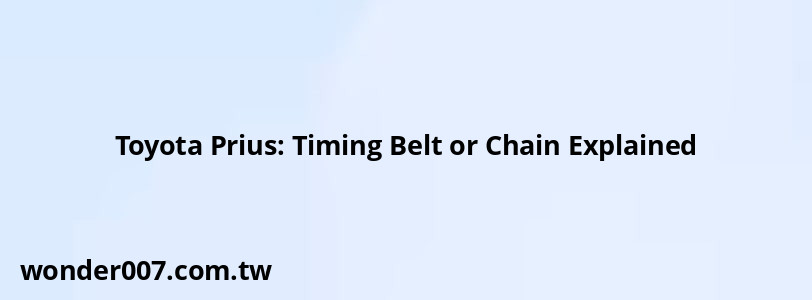Toyota Prius: Timing Belt or Chain Explained

The Toyota Prius, a popular hybrid vehicle, utilizes a timing chain rather than a timing belt. This design choice is significant for several reasons, particularly regarding maintenance and longevity.
Overview of Timing Components
In automotive engineering, the timing system is crucial for synchronizing the engine's components. A timing belt typically requires regular replacement, often every 60,000 to 100,000 miles, while a timing chain is generally considered a lifetime component.
Key Differences Between Timing Belts and Chains
- Material: Timing belts are made of rubber and require replacement due to wear. Timing chains are made of metal and are designed to last the life of the engine.
- Maintenance: Timing belts need regular checks and replacements, while timing chains usually do not have a specified replacement interval.
- Failure Mode: A broken timing belt can lead to severe engine damage in interference engines, whereas timing chains often provide warning signs before failure.
Toyota Prius Timing System
From model years 2001 to 2024, all Toyota Prius vehicles are equipped with a timing chain. This system is classified as an interference engine, meaning that if the timing chain fails, it could potentially cause significant engine damage. However, the durability of the timing chain means it is less likely to fail compared to a belt.
Maintenance Insights
- Inspection: While timing chains do not require routine replacement, they should be inspected periodically for wear and tension.
- Water Pump: The water pump in the Prius is belt-driven but is separate from the timing chain system. It may need replacement based on its condition.
| Model Year | Engine Type | Timing Component | Interference | Service Interval | |
|---|---|---|---|---|---|
| 2024 | 2.0L Hybrid | Timing Chain | Yes | Lifetime | |
| 2023 | 2.0L Hybrid | Timing Chain | Yes | Lifetime | |
| 2022 | 1.8L Hybrid | Timing Chain | Yes | Lifetime | |
| 2021 | 1.8L Hybrid | Timing Chain | Yes | Lifetime | |
| 2020 | 1.8L Hybrid | Timing Chain | Yes | Lifetime | |
| 2019 | 1.8L Hybrid | Timing Chain | Yes | Lifetime | |
| 2018 | 1.8L Hybrid | Timing Chain | Yes | Lifetime | |
| 2017 | 1.8L Hybrid | Timing Chain | Yes | Lifetime | |
| 2016 | 1.8L Hybrid | Timing Chain | Yes | <Lifetime | |
| 2015 | |||||
